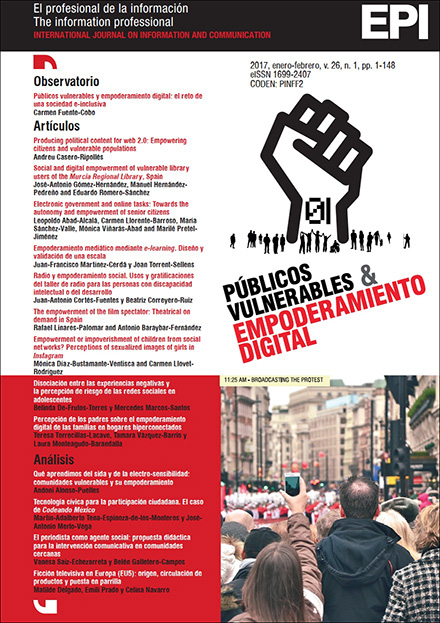What we learned from AIDS and electro-sensitivity: Vulnerable communities and their empowerment
DOI:
https://doi.org/10.3145/epi.2017.ene.11Keywords:
Science, Citizen science, Communities, Concerned people, Risk, Exclusion, Medicine, Diseases, AIDS, Electro-sensitivity.Abstract
21st century science has recruited amateurs and aficionados as a workforce to undertake large projects. Citizen science shows a large variety of models that can produce knowledge. Citizen science supposedly represents a democratic shift and as a result experts and expertise have been questioned. However, vulnerable and/or concerned communities may be a group, or "subtype", that can be represented within citizen science. To analyze that subtype we must take into account the risk of exclusion and the notion of concerned community. ACT UP´s AIDS campaign is a good example of how to achieve changes on both politics and knowledge; electro-sensitivity is another case of success in the era of the internet. Both movements have deeply influenced online activism related to AIDS and electro-sensitivity. Nevertheless, a cautious approach should be taken because it is possible to transform those strategies into revenue sources that may risk vulnerability and exclusion.
Downloads
Downloads
Published
How to Cite
Issue
Section
License
Dissemination conditions of the articles once they are published
Authors can freely disseminate their articles on websites, social networks and repositories
However, the following conditions must be respected:
- Only the editorial version should be made public. Please do not publish preprints, postprints or proofs.
- Along with this copy, a specific mention of the publication in which the text has appeared must be included, also adding a clickable link to the URL: http://www.profesionaldelainformacion.com
- Only the final editorial version should be made public. Please do not publish preprints, postprints or proofs.
- Along with that copy, a specific mention of the publication in which the text has appeared must be included, also adding a clickable link to the URL: http://revista.profesionaldelainformacion.com
Profesional de la información journal offers the articles in open access with a Creative Commons BY license.




